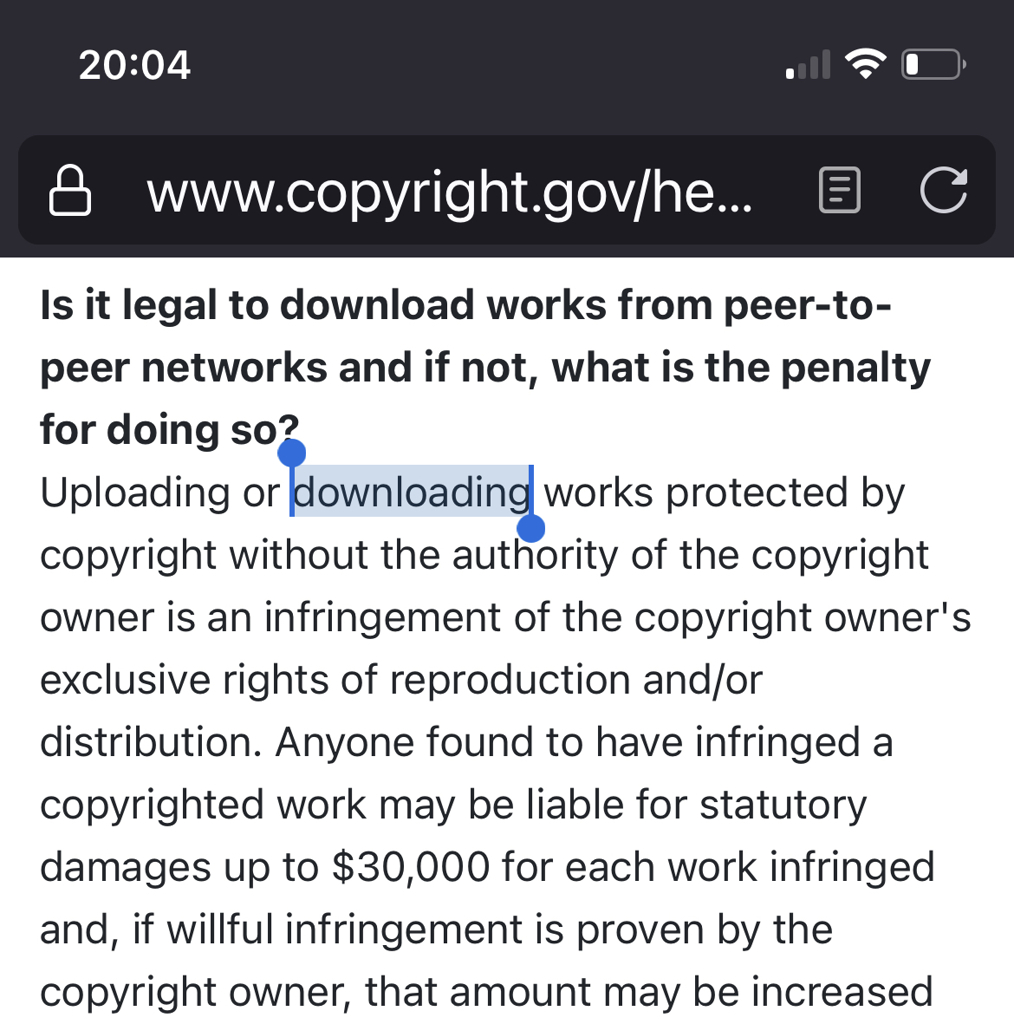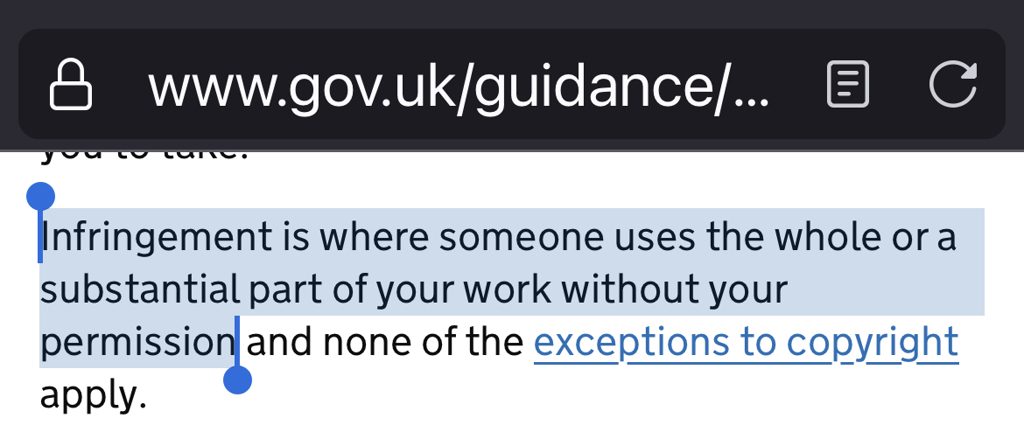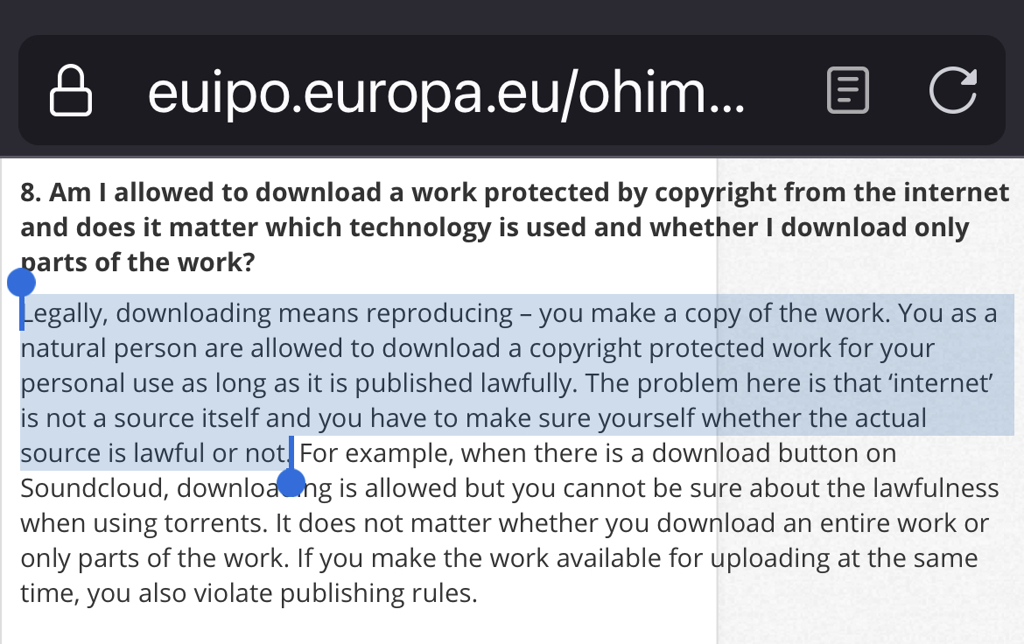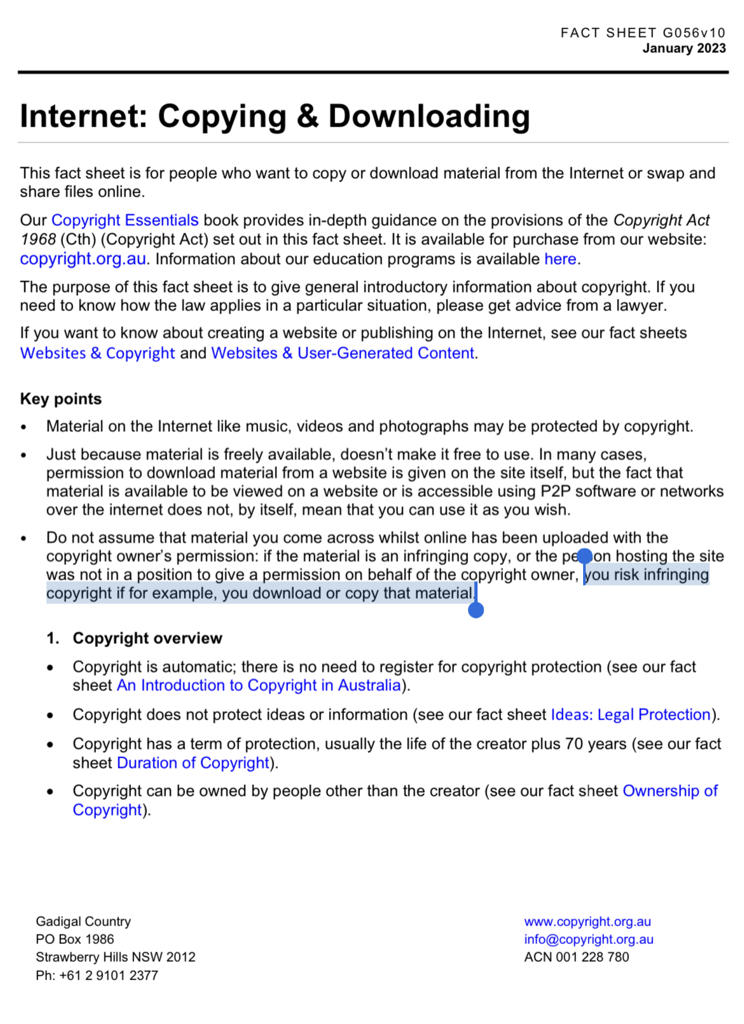There was still copyright infringement because the company probably downloaded the text (which created another copy) and modified it (alteration is also protected by copyright) before using it as training data. If you write an original novel and admit that you had pirated a bunch of novels to use for reference, those novels were still downloaded illegally even if you’ve deleted them by now. The AI isn’t copyright infringement itself, it’s proof that copyright infringement has happened.
But personally I don’t think the actual laws will matter so much as which side has the better case for why they will lead to more innovation and growth for the economy.
There was still copyright infringement because the company probably downloaded the text (which created another copy)
Sure, someone likely infringed on copyright for that copy to be created, but the person/entity committing that infringement is the sender, not the receiver. The uploader is the infringing party, not the downloader.
If you write an original novel and admit that you had pirated a bunch of novels to use for reference, those novels were still downloaded illegally even if you’ve deleted them by now.
They were uploaded illegally. The people who distributed those copies to me have infringed on copyright, sure. My receiving those copies does not constitute infringement. Uploading is the illegal act, not downloading.
My work does not violate copyright, unless I use a substantial part of the other works. But, if I used substantial parts of those works, my work would be some sort of “derivation” and not the “original novel” you declared it. (Many types of derivation fall within “fair use” and do not constitute infringement.)
Whether I delete the works or not is entirely irrelevant. I am prohibited from creating and distributing additional copies, but I am not prohibited from receiving, possessing, or consuming an unauthorized copy.
The uploader is the infringing party, not the downloader.
an exclusive right of the copyright holder is the right to duplicate their work. downloading IS illegal because you’re creating an unauthorized duplicate of the work on your machine. your duplicate is distinct from the duplicate that someone else had created and uploaded. it’s just very hard to get caught downloading, and it’s not very cost effective for companies to pursue since they would only stop one person. that’s why most companies like the RIAA targeted torrents for their lawsuits, because they could easily see the ip addresses (which is why you should always use a vpn when torrenting) and because they could shut down uploaders. but downloading itself is still very illegal
My work does not violate copyright, unless I use a substantial part of the other works.
like I said, the AI is not a violation (probably, unless the courts later disagree), it’s proof that unauthorized duplication of copyrighted works has occurred, and that is illegal
You cannot create a copy of a work that you do not possess. The downloader does not possess the work to create a copy. Only the uploader is even capable of creating the copy. The downloader cannot create a copy; he can only request.
If he does something else with that copy he receives, he becomes something other than merely a downloader. That “something else” could be unlawful, but that “something else” is not “downloading”.
It could be unlawful if the downloader gains unauthorized access to the computer system, but that would not be a copyright violation. It could be unlawful if the downloader conspires with the uploader, but the degree of collaboration would have to be much greater to support a conspiracy charge.
Downloading does not meet the statutory criteria for copyright infringement. Downloading alone is not infringement.
There was still copyright infringement because the company probably downloaded the text (which created another copy) and modified it (alteration is also protected by copyright) before using it as training data. If you write an original novel and admit that you had pirated a bunch of novels to use for reference, those novels were still downloaded illegally even if you’ve deleted them by now. The AI isn’t copyright infringement itself, it’s proof that copyright infringement has happened.
But personally I don’t think the actual laws will matter so much as which side has the better case for why they will lead to more innovation and growth for the economy.
Sure, someone likely infringed on copyright for that copy to be created, but the person/entity committing that infringement is the sender, not the receiver. The uploader is the infringing party, not the downloader.
They were uploaded illegally. The people who distributed those copies to me have infringed on copyright, sure. My receiving those copies does not constitute infringement. Uploading is the illegal act, not downloading.
My work does not violate copyright, unless I use a substantial part of the other works. But, if I used substantial parts of those works, my work would be some sort of “derivation” and not the “original novel” you declared it. (Many types of derivation fall within “fair use” and do not constitute infringement.)
Whether I delete the works or not is entirely irrelevant. I am prohibited from creating and distributing additional copies, but I am not prohibited from receiving, possessing, or consuming an unauthorized copy.
an exclusive right of the copyright holder is the right to duplicate their work. downloading IS illegal because you’re creating an unauthorized duplicate of the work on your machine. your duplicate is distinct from the duplicate that someone else had created and uploaded. it’s just very hard to get caught downloading, and it’s not very cost effective for companies to pursue since they would only stop one person. that’s why most companies like the RIAA targeted torrents for their lawsuits, because they could easily see the ip addresses (which is why you should always use a vpn when torrenting) and because they could shut down uploaders. but downloading itself is still very illegal
like I said, the AI is not a violation (probably, unless the courts later disagree), it’s proof that unauthorized duplication of copyrighted works has occurred, and that is illegal
You cannot create a copy of a work that you do not possess. The downloader does not possess the work to create a copy. Only the uploader is even capable of creating the copy. The downloader cannot create a copy; he can only request.
If he does something else with that copy he receives, he becomes something other than merely a downloader. That “something else” could be unlawful, but that “something else” is not “downloading”.
It could be unlawful if the downloader gains unauthorized access to the computer system, but that would not be a copyright violation. It could be unlawful if the downloader conspires with the uploader, but the degree of collaboration would have to be much greater to support a conspiracy charge.
Downloading does not meet the statutory criteria for copyright infringement. Downloading alone is not infringement.
US
UK
EU
Australia cuz why the hell not
The “You wouldn’t steal a car” anti-piracy ad is coming to mind lol